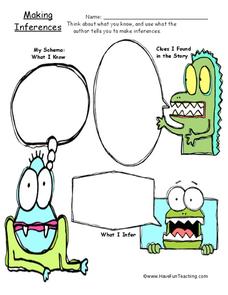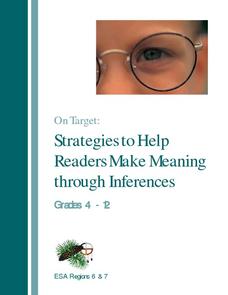Have Fun Teaching
Making Inferences (18)
Here's a bright idea. Model for readers how to use what they know about a story and combine this knowledge with clues from the text to formulate inferences about the story.
Have Fun Teaching
Inferences (2)
Encourage young readers to use their prior knowledge, as well as text clues, to draw inferences from text. Provide them with this worksheet that asks them to record a passage, the background information they already have, the text clues...
Have Fun Teaching
Making Inferences (1)
Provide readers with an opportunity to practice drawing inferences by giving them this worksheet. Kids identify the text and author, record a sentence they believe infers rather than directly says, and then write the deeper meaning the...
Have Fun Teaching
Making Inferences (21)
Monstrous! But do not be afraid! These weird-looking creatures won't scare readers away from making inferences about what authors are trying to show, rather than tell their readers. Instead the toothy, bug-eyed aliens model the process...
Curated OER
On Target: Strategies to Help Readers Make Meaning through Inferences
Here's a resource that explicitly teaches, models, and provides readers with opportunities to practice the process of drawing inferences from text. Packed with strategies elementary, middle, and high school teachers can use, the resource...
Have Fun Teaching
Making Inferences Special Night (12)
Young writers will enjoy clowning around with this worksheet that asks them to use clues in Katie's story to infer what is happening. Careful readers won't be tricked. The activity is a real treat.
Have Fun Teaching
Making Inferences (11)
Picture this. Kids read a story starter about Josh and his dad, use details in the tale to infer what will happen next, and then draw a picture of this outcome.
Have Fun Teaching
Making Inferences (19)
Good readers use what they know and clues found in a story to make inferences about what a writer wants readers to consider. Here's a graphic that supports this comprehension strategy and asks kids to record what they know, the clues...
Greater Clark County Schools
Observations and Inferences
A cartoon from the far side of Gary Larsen's wacky world provides an opportunity for critical thinkers to practice their skills distinguishing between observations and inferences. What fun.
Curated OER
Using Random Sampling to Draw Inferences
Emerging statisticians develop the ability to make inferences from sample data while also working on proportional relationships in general. Here, young learners examine samples for bias, and then use random samples to make inferences...
Have Fun Teaching
Making Inferences (8)
Kids examine the clues provided by a prompt to infer what will happen next. They then illustrate the short story.
Ed Worksheets
Read the Story
Want to boost your readers' comprehension skills and strategies? Look to these five pages, each with a short story and questions to answer covering main idea, facts, sequence of events, context clues, conclusions, and making inferences.
Curated OER
The True Confessions of Charlotte Doyle: Graphic Organizer
After completing the first five chapters of The True Confessions of Charlotte Doyle By Avi, use direct quotes to make inferences about how Charlotte feels about certain characters. Later, when the novel has concluded, revisit the text to...
Great Books Foundation
Picture-Books in Winter
Five questions challenge scholars to make inferences after reading a poem, "Picture-Books in Winter" by Robert Louis Stevenson.
August House
Anansi Goes to Lunch - Kindergarten
Greed is the theme of the West African folktale, Anansi Goes to Lunch and this multidisciplinary collection of lessons. First, scholars listen to a read aloud and participate in a grand conversation about the book's key details and...
Have Fun Teaching
You Make the Call (10)
What will happen next? Young writers plot what will happen next after studying the clues in four story starters.
K12 Reader
Setting the Scene: Great Expectations
Expect great things from this reading comprehension exercise that asks readers to cite evidence from the provided passages of Great Expectations to support the inference that Charles Dickens' Miss Havisham, and her room, are indeed strange.
Curated OER
Reading Comprehension: Guinness Book of World Records
If your learners are curious about human achievement, superlatives, or esoteric trivia, the Guinness Book of Records is a way to tap into instrinsic motivation and relevance. Here's an informational reading that will grab their attention...
It's About Time
Mass Extinction and Fossil Records
The focus of a fossil-based lesson uses graphs and charts that allow young paleontologists to make inferences about events of mass extinction. They must apply their previous knowledge about fossil records in this final lesson of the...
Great Books Foundation
The Fox and the Stork
Young readers take part in a meaningful discussion following a reading of Aesop's fable "The Fox and the Stork." Five questions focus on the characters' actions and offering apologies.
August House
The Great Smelly, Slobbery, Small-Tooth Dog
Read the story The Great Smelly, Slobbery, Small-Tooth Dog: A Folktale from Great Britain by Margaret Read MacDonald and choose from multiple activities to learn about the tale's theme—kindness. With so many options, your kind kids will...
Utah Education Network (UEN)
Probability and Statistics
MAD about statistics? In the seventh chapter of an eight-part seventh-grade workbook series, learners develop probability models and use statistics to draw inferences. In addition, learners play games and conduct experiments to determine...
Massasoit Community College
Vocabulary: Getting Meaning From Context
Introduce your class to four different types of context clues: definition, example, comparison or contrast, and inference. Each type has its own description, example, and practice set. After pupils have mastered the four types, put it...
Institute for the Professional Development of Adult Educators
Using Context Clues with Signal Words
When you come across an unfamiliar word in a text, do you skip it and move on? Practice using context clues to identify words you don't know with a thorough set of language arts lessons. The resource reinforces close reading and critical...

























